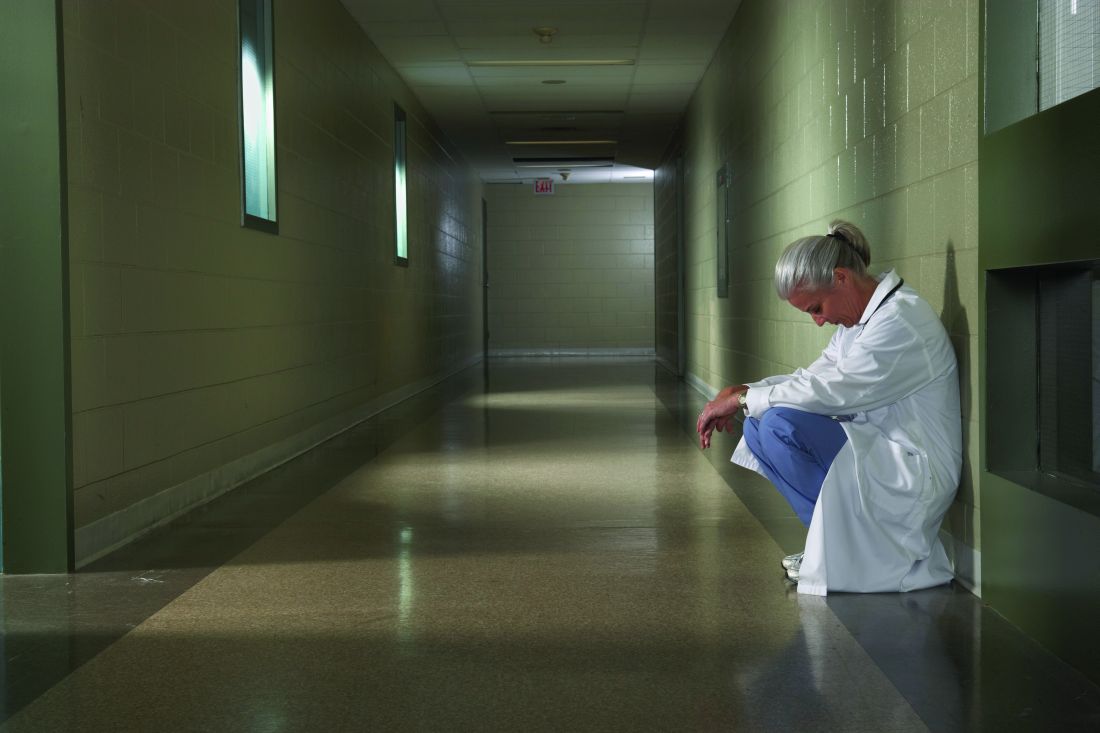User login
Rates of suicidal thoughts and attempted suicide among endocrinologists declined from 2022 and now rank similar to the average rate among physicians overall, but these rates are still higher than the general public, according to survey findings.
The current report about suicide among endocrinologists, titled, “Doctors’ Burden: Endocrinologist Suicide Report 2023,” was recently published.
A report about suicide among physicians overall, based on the same survey, titled, “Doctors’ Burden: Medscape Physician Suicide Report 2023,” was published previously.
Improved rates among 28 medical specialties
In the 2022 survey of a representative national sample of 13,069 U.S. physicians, 10% of endocrinologists reported having suicidal thoughts, ranking the specialty sixth among 29 medical specialties that year.
The 2023 survey found that in a representative national sample of 9,175 U.S. physicians, 8% of endocrinologists reported having suicidal thoughts, roughly the average rate among clinicians overall, ranking it 20th among 29 medical specialties.
The highest rates of thoughts of suicide in the latest survey were reported by physicians in otolaryngology (13%), followed by physicians in psychiatry, family medicine, anesthesiology, obstetrics/gynecology, and emergency medicine (roughly 12% in each specialty).
The rate of attempted suicide was 1% among endocrinologists, which was also the rate among physicians overall.
More female than male endocrinologists reported contemplating suicide (8% versus 5%). In addition, 1% of male endocrinologists reported that they had attempted suicide and 2% of female endocrinologists replied they preferred not to answer the question about attempted suicide.
In contrast, in 2020, an estimated 4.9% of U.S. adults aged 18 and older had serious thoughts about suicide and 0.5% attempted suicide, according to the National Institutes of Health website, the latest report states.
Rates of suicidal thoughts and suicide attempts among physicians overall “are worryingly high numbers,” Peter Yellowlees, MBBS, MD, emeritus professor of psychiatry at University of California, Davis, Health, and chief executive officer, Asynchealth, said in the report.
Confiding in others, good mental health habits, resources
In the 2023 survey, half of the endocrinologists who had thought about suicide had confided in a therapist and 41% had spoken to a family member, but none had told a colleague or a friend, or phoned a suicide hotline.
On the other hand, 7% of male and 10% of female endocrinologists, and 9% of male and 11% of female physicians overall, reported that a colleague had shared suicidal thoughts with them.
“It’s pleasing that physicians overall have shown themselves slightly more likely to bring ideas about suicide to a therapist and less likely to keep their distress entirely to themselves,” Dr. Yellowlees said.
“It’s possible that the need for health care is becoming less stigmatized nationally, with large and increasing emphasis on physician well-being during and after the COVID-19 pandemic,” he suggested.
Endocrinologists reported that to keep happy and have good mental health, they engaged in activities and hobbies (70%), exercised (66%), spent time with family and friends (63%), got enough sleep (56%), ate healthy (48%), went to therapy (11%), or did other things (8%), which was similar to that reported by physicians overall.
The report lists several resources that are specific for physicians having suicidal thoughts (Physician Support Line, 988 Suicide and Crisis Lifeline, Peer RxMed, International Association for Suicide Prevention, and the American Foundation for Suicide Prevention) along with contact information.
The 2023 survey was conducted from June 28, 2022, to Oct. 3, 2022, and the 2022 survey was conducted from June 29, 2021, to Sept. 26, 2021.
A version of this article first appeared on Medscape.com.
Rates of suicidal thoughts and attempted suicide among endocrinologists declined from 2022 and now rank similar to the average rate among physicians overall, but these rates are still higher than the general public, according to survey findings.
The current report about suicide among endocrinologists, titled, “Doctors’ Burden: Endocrinologist Suicide Report 2023,” was recently published.
A report about suicide among physicians overall, based on the same survey, titled, “Doctors’ Burden: Medscape Physician Suicide Report 2023,” was published previously.
Improved rates among 28 medical specialties
In the 2022 survey of a representative national sample of 13,069 U.S. physicians, 10% of endocrinologists reported having suicidal thoughts, ranking the specialty sixth among 29 medical specialties that year.
The 2023 survey found that in a representative national sample of 9,175 U.S. physicians, 8% of endocrinologists reported having suicidal thoughts, roughly the average rate among clinicians overall, ranking it 20th among 29 medical specialties.
The highest rates of thoughts of suicide in the latest survey were reported by physicians in otolaryngology (13%), followed by physicians in psychiatry, family medicine, anesthesiology, obstetrics/gynecology, and emergency medicine (roughly 12% in each specialty).
The rate of attempted suicide was 1% among endocrinologists, which was also the rate among physicians overall.
More female than male endocrinologists reported contemplating suicide (8% versus 5%). In addition, 1% of male endocrinologists reported that they had attempted suicide and 2% of female endocrinologists replied they preferred not to answer the question about attempted suicide.
In contrast, in 2020, an estimated 4.9% of U.S. adults aged 18 and older had serious thoughts about suicide and 0.5% attempted suicide, according to the National Institutes of Health website, the latest report states.
Rates of suicidal thoughts and suicide attempts among physicians overall “are worryingly high numbers,” Peter Yellowlees, MBBS, MD, emeritus professor of psychiatry at University of California, Davis, Health, and chief executive officer, Asynchealth, said in the report.
Confiding in others, good mental health habits, resources
In the 2023 survey, half of the endocrinologists who had thought about suicide had confided in a therapist and 41% had spoken to a family member, but none had told a colleague or a friend, or phoned a suicide hotline.
On the other hand, 7% of male and 10% of female endocrinologists, and 9% of male and 11% of female physicians overall, reported that a colleague had shared suicidal thoughts with them.
“It’s pleasing that physicians overall have shown themselves slightly more likely to bring ideas about suicide to a therapist and less likely to keep their distress entirely to themselves,” Dr. Yellowlees said.
“It’s possible that the need for health care is becoming less stigmatized nationally, with large and increasing emphasis on physician well-being during and after the COVID-19 pandemic,” he suggested.
Endocrinologists reported that to keep happy and have good mental health, they engaged in activities and hobbies (70%), exercised (66%), spent time with family and friends (63%), got enough sleep (56%), ate healthy (48%), went to therapy (11%), or did other things (8%), which was similar to that reported by physicians overall.
The report lists several resources that are specific for physicians having suicidal thoughts (Physician Support Line, 988 Suicide and Crisis Lifeline, Peer RxMed, International Association for Suicide Prevention, and the American Foundation for Suicide Prevention) along with contact information.
The 2023 survey was conducted from June 28, 2022, to Oct. 3, 2022, and the 2022 survey was conducted from June 29, 2021, to Sept. 26, 2021.
A version of this article first appeared on Medscape.com.
Rates of suicidal thoughts and attempted suicide among endocrinologists declined from 2022 and now rank similar to the average rate among physicians overall, but these rates are still higher than the general public, according to survey findings.
The current report about suicide among endocrinologists, titled, “Doctors’ Burden: Endocrinologist Suicide Report 2023,” was recently published.
A report about suicide among physicians overall, based on the same survey, titled, “Doctors’ Burden: Medscape Physician Suicide Report 2023,” was published previously.
Improved rates among 28 medical specialties
In the 2022 survey of a representative national sample of 13,069 U.S. physicians, 10% of endocrinologists reported having suicidal thoughts, ranking the specialty sixth among 29 medical specialties that year.
The 2023 survey found that in a representative national sample of 9,175 U.S. physicians, 8% of endocrinologists reported having suicidal thoughts, roughly the average rate among clinicians overall, ranking it 20th among 29 medical specialties.
The highest rates of thoughts of suicide in the latest survey were reported by physicians in otolaryngology (13%), followed by physicians in psychiatry, family medicine, anesthesiology, obstetrics/gynecology, and emergency medicine (roughly 12% in each specialty).
The rate of attempted suicide was 1% among endocrinologists, which was also the rate among physicians overall.
More female than male endocrinologists reported contemplating suicide (8% versus 5%). In addition, 1% of male endocrinologists reported that they had attempted suicide and 2% of female endocrinologists replied they preferred not to answer the question about attempted suicide.
In contrast, in 2020, an estimated 4.9% of U.S. adults aged 18 and older had serious thoughts about suicide and 0.5% attempted suicide, according to the National Institutes of Health website, the latest report states.
Rates of suicidal thoughts and suicide attempts among physicians overall “are worryingly high numbers,” Peter Yellowlees, MBBS, MD, emeritus professor of psychiatry at University of California, Davis, Health, and chief executive officer, Asynchealth, said in the report.
Confiding in others, good mental health habits, resources
In the 2023 survey, half of the endocrinologists who had thought about suicide had confided in a therapist and 41% had spoken to a family member, but none had told a colleague or a friend, or phoned a suicide hotline.
On the other hand, 7% of male and 10% of female endocrinologists, and 9% of male and 11% of female physicians overall, reported that a colleague had shared suicidal thoughts with them.
“It’s pleasing that physicians overall have shown themselves slightly more likely to bring ideas about suicide to a therapist and less likely to keep their distress entirely to themselves,” Dr. Yellowlees said.
“It’s possible that the need for health care is becoming less stigmatized nationally, with large and increasing emphasis on physician well-being during and after the COVID-19 pandemic,” he suggested.
Endocrinologists reported that to keep happy and have good mental health, they engaged in activities and hobbies (70%), exercised (66%), spent time with family and friends (63%), got enough sleep (56%), ate healthy (48%), went to therapy (11%), or did other things (8%), which was similar to that reported by physicians overall.
The report lists several resources that are specific for physicians having suicidal thoughts (Physician Support Line, 988 Suicide and Crisis Lifeline, Peer RxMed, International Association for Suicide Prevention, and the American Foundation for Suicide Prevention) along with contact information.
The 2023 survey was conducted from June 28, 2022, to Oct. 3, 2022, and the 2022 survey was conducted from June 29, 2021, to Sept. 26, 2021.
A version of this article first appeared on Medscape.com.

